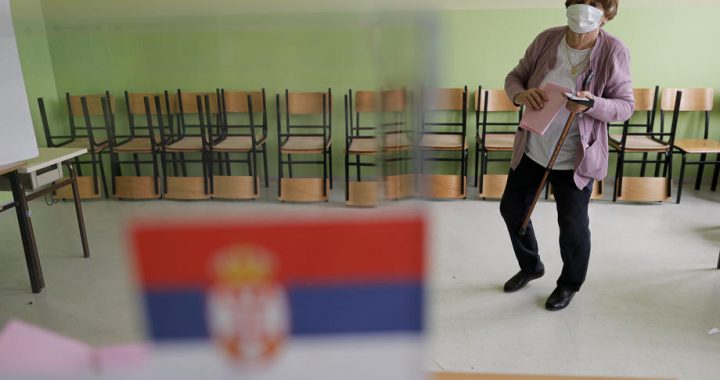

 A woman wearing a protective face mask prepares to cast her ballot for the Serbian parliamentary elections at a polling station in the town of Gracanica, located near Pristina, Kosovo, 21 June 2020. EPA-EFE/VALDRIN XHEMAJ
A woman wearing a protective face mask prepares to cast her ballot for the Serbian parliamentary elections at a polling station in the town of Gracanica, located near Pristina, Kosovo, 21 June 2020. EPA-EFE/VALDRIN XHEMAJ
The deputy head of the opposition Democratic League of Kosovo, LDK, said that PM Kurti’s demands before allowing Kosovo Serbs to vote in Kosovo in Serbian elections had damaged the country's image.
After Kosovo’s Prime Minister Albin Kurti seemed to dismiss the possibility of Serbs voting in Kosovo for presidential and parliamentary elections in Serbia this Sunday, an opposition party said the move will prove harmful for the country.
Lutfi Haziri, a senior Democratic League of Kosovo LDK official in charge of Kosovo-Serbia issues, said Kurti’s demand for a prior agreement between Kosovo and Serbia based on exchange of letters overturns Kosovo’s long-time approach, based on international mediation in disputes between the countries.
“We have principles that negotiations [with Serbia] for 32 years, especially since the Vienna dialogue [on Kosovo’s final status] which say that Kosovo does not negotiate directly with Serbia without the involvement of international mediators and without United States’ guarantees.
“Principles are also that negotiations will be held neither in Kosovo nor Serbia but in a neutral country,” Haziri said, referring to the 2006-2007 dialogue which led to Kosovo’s declaration of independence in 2008, done in coordination with the US and most European Union countries, but which Serbia refuses to recognise.
“A direct communication with exchange of letters could breach these principles,” he added.
In his view, the Kosovo government did not clearly reject the idea of Serbs voting within Kosovo.
“Even today, we don’t have any decision from government or Prime Minister which says Serbian elections cannot be held [within Kosovo]. He [Kurti] has said that elections will not be held without any exchange of letters, which means an official request from Serbia to hold elections within Kosovo’s territory,” Haziri said.
Since Serbia’s 2012 parliamentary elections, Kosovo Serbs have cast votes in Kosovo using a process in which the OSCE take the votes from the polling stations to counting centres in Serbia.
The French, German, Italian, British and United States ambassadors to Pristina and Belgrade, representing the so-called QUINT countries, said last week that Kosovo had “failed to demonstrate its commitment to the principle of protecting the civil and political rights of all its citizens, including members of minority groups”, by not allowing polling stations to be organised for Serbs to vote in Kosovo.
This “has damaged Kosovo’s political image to the QUINT members because our side has never conditioned the [voting] process so far”, Haziri said.
Another major opposition party, the Alliance for Future of Kosovo, AAK, led by ex-Prime Minister Ramush Haradinaj said that they oppose holding Serbian elections in Kosovo, but criticised Kurti’s failure to consult a broad political spectrum in Kosovo on this issue.
“AAK does not want Serbia’s elections to be held in Kosovo without a prior agreement with Serbia, AAK deputy head Ardian Gjini told BIRN.
“The government is ignoring the opposition,” he complained.
Kurti has said that Belgrade must first reach an agreement with Pristina for voting in Serbian elections to take place on Kosovo’s territory.
“We do not want to prevent the citizens of our republic with dual citizenship from voting but at the same time we cannot act in violation of the legality and constitutionality of the country,” Kurti told Western ambassadors last week.
On January 15, Kosovo’s parliament adopted a resolution that opposed Kosovo Serbs voting in Serbian elections on Kosovo territory.
Kurti said last week that he wanted to uphold that resolution but not to “make it impossible” for “citizens of Kosovo with Serbian passports to exercise their right to vote”.
31 March 2022 - 16:34

The public was flooded with disinformation during the election period ...

At a time when lies can be fabricated in seconds and politics can be m...

At a moment when democracy is increasingly shaped and shaken by digita...

Mayors from the Belgrade-backed party representing Kosovo Serbs, Srpsk...